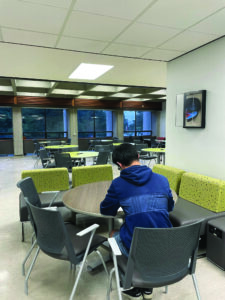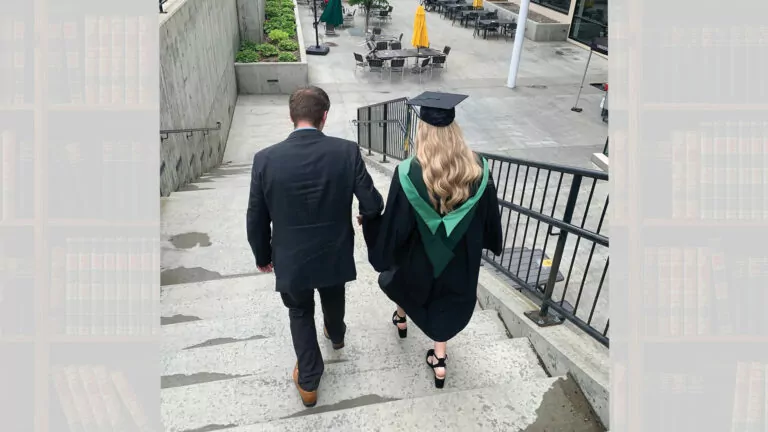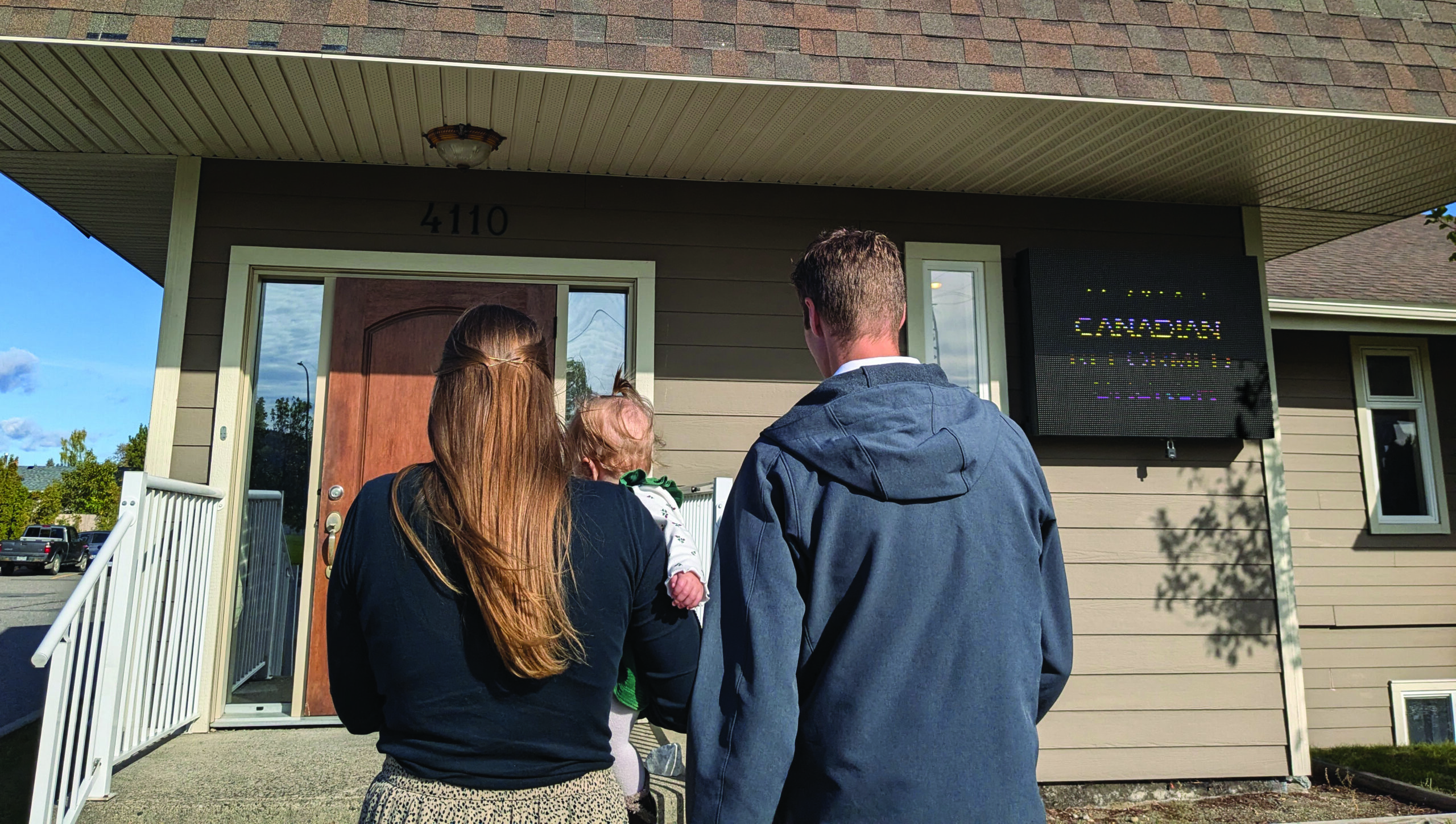You can be blessed, and be a blessing, at a secular college
*****
When Gillian, a 21-year-old from Langley, BC, talks about her love for art, her face lights up. Throughout high school she saw art as a way to glorify God and use her talents, so when it was time to make post-secondary plans, she decided to pursue a visual arts degree at the University of the Fraser Valley (UFV).
However, it didn’t take long for her to realize that the program wasn’t for her. She describes walking into the hallway of her building at UFV and seeing a large, irreverent parody of Michelangelo’s famous “Creation of Adam,” now filled with LGBTQ imagery. Art here was not about glorifying God; it was about “how we’ll break the status quo.” With no Christian friends in her classes, and the culture shock of her new environment, Gillian also felt very alone on campus.
“It just wasn’t good for my personal and faith life,” she says, adding that the experience – including recognizing the negative impacts – was still a beneficial time of growth for her.
Gillian finished her term, then took some time to reconsider her options and try out a few jobs. She says these were valuable months of figuring out what she did and didn’t want to do. One thing she concluded was that she still wanted to do something creative.
As she explored different programs and talked to different people, she was intrigued by commercial interior design. Happily, she was accepted into the interior design program at the British Columbia Institute of Technology (BCIT), which has turned out to be a much better fit. She enjoys the work, as well as the more professional environment: “People talk about their career plans, not their pronouns.”
When she reflects on her post-secondary journey, she advises younger students to know what they’re getting into: “Know the bias of your chosen faculty or department.” She recommends talking to other Christians who have gone through a program you’re considering. And when you’re on campus, she suggests searching for a Christian club to join, and making the most of what they offer. As well, she says, don’t lose touch with your church and Christian school friends: “You have to hang onto them.”
A good fit?
As Gillian discovered, one secular university or faculty may not be a good place for a particular student while another program may be a great fit. Non-Christian universities have their own challenges for young Christians, but they can also be places where Christians can be blessed and be a blessing.
So why might someone choose a secular college or university – and what might their experiences be like? How can their time at a non-Christian institution be beneficial for them, and a blessing to their neighbors? And how can they thrive there?
I asked a number of current and former students for their thoughts.
Making the choice
For many, the choice of school was based largely on very practical considerations: cost, location, or acceptance into a particular program. Non-Christian colleges are significantly less expensive to attend than Christian ones, and chances are there’s one close by.
James, a recent nursing graduate from the University of Northern BC, chose his school because of the generous scholarship he received, as well as its location in Prince George, BC – a town with a good Reformed church, and with a manageable cost of living, that is only a few hours away from his hometown of Smithers.
Amy, his younger sister, opted to try out the University of the Fraser Valley (UFV), where she could live with her grandparents and attend one of the many local Reformed churches. The smaller campus and smaller class sizes of UFV also appealed to her.
Luke, a young articling student in Edmonton, AB, chose the University of Alberta so he could live at home during his studies and save money (“Thanks, Mom and Dad”) and stay connected to his Christian friend group. U of A was also a “top 5” university in Canada, so he felt it would be a good place for his personal and professional development as he pursued his law studies.
While most of the students I talked to cited considerations such as cost, convenience, and alignment with career goals, they also all noted that proximity to a solid church remained an important factor.
Mixed experiences
So what was it like for these students, many of whom had attended a Christian school and lived largely within a Reformed community their whole life?
Experiences, both socially and academically, were mixed.
Emily, a young physiotherapist who grew up in the small, largely Reformed town of Lynden, Washington, found tolerance and respect among her classmates at the Okanagan campus of the University of British Columbia (UBCO) – but also some real hostility from her dormmates. She formed some close connections with her fellow human kinetics students: “Even though we were quite the blend of upbringings and backgrounds, we respected each other’s differences and it was in these times that I got to speak about my faith and answer their questions, without being attacked or ridiculed.”
At the same time, she found it difficult to be the only “church girl” on her dorm floor. “There is a difference between living among unbelievers and living with unbelievers. I was accused of being a ‘hater’ yet teased about ‘being the good girl who went to church.’ Home (my dorm) was no longer a safe space like it was growing up; now it was a spiritual warzone. And yet this experience was one of the best things that happened to me. This taught me how to defend my faith – when to do it and how to do it – with people I lived with.”
 Ben, who is studying criminology at Simon Fraser University in Vancouver, has found that the social sciences are a tough place to express Christian viewpoints. He says there’s lots of “anti-Christian rhetoric” in fields like psychology and sociology; “Christians are the number-one bad guys.” And although there are several small conservative groups on campus (made up largely of Christians), he says they don’t feel particularly welcome there; Ben mentions that any pro-life or anti-pornography materials that the groups post are very quickly ripped down.
Ben, who is studying criminology at Simon Fraser University in Vancouver, has found that the social sciences are a tough place to express Christian viewpoints. He says there’s lots of “anti-Christian rhetoric” in fields like psychology and sociology; “Christians are the number-one bad guys.” And although there are several small conservative groups on campus (made up largely of Christians), he says they don’t feel particularly welcome there; Ben mentions that any pro-life or anti-pornography materials that the groups post are very quickly ripped down.
James, at the University of Northern BC, didn’t find as much overt hostility to Christianity in his classes, but did soon notice that his Christian worldview and values were an exception on campus. He remembers a first-year English professor who repeatedly used “very [sexually] explicit” writing samples in his teaching; week after week, “I would sit there, quietly and awkwardly,” James remembers wryly. Eventually James gathered up his courage and talked to the professor about it during office hours. “I explained that the examples made me uncomfortable, and could he tone them down a bit?” James says that the professor was “surprised, but receptive. He apologized and promised to change his examples. He was a nice guy, actually.”
As Sam, who is completing a history major/English minor degree at UFV with a view to teaching, notes, how much conflict you encounter is partly up to you. “A debate will only break out if you spark a debate.” There may be times to (constructively) stick out your neck, like James did, and other times when you need to consider your response carefully.
“There are times to refuse being drawn into silly questions, which Paul told Timothy to avoid,” says Emily, citing 2 Timothy 2, “yet times to answer, but with gentleness, so that [unbelievers] might have a chance to come to know the truth.”
More and more difficult?
Is it harder to be a Christian on a non-Christian campus now than it was ten or twenty years ago?
Harma-Mae, a regular RP contributor who completed a history degree in 2013, reflects on the ideological shifts that have taken place in the last few decades: “When I was in school there was a good amount of postmodernism (i.e., there are many perspectives and we can’t tell which one is true, or if there even is any truth), which seemed to result in many perspectives being allowed to be shared and voiced, as long as it was just another perspective. So there were times when I could say what my perspective was. Now I think there is much more tolerance for censorship – it seems to be allowed to view some perspectives as wrong, though they would probably be called ‘harmful’ rather than wrong. Which means that a young person today would face different challenges than what [I] faced!”
Secular vs. Christian colleges
When I was a student, there was a saying in our church community that the devil wore “klompen” (those noisy wooden shoes that the Dutch are, apparently, so fond of) at the public universities, but snuck around in “stocking feet” at the local evangelical Christian one. The point wasn’t so much to disparage Christian institutions as to acknowledge the different, more subtle dangers and attacks against their faith that young people might encounter at such places.
There’s something straightforward about attending a secular university. You know that you won’t agree with a lot of what you hear; you’re on your guard; you take what’s useful, but don’t particularly expect to find your new best friends or a community where you’ll belong. As Harma-Mae puts it, “I preferred to be taught from a secular perspective because I found it more tiring to try to evaluate Christian teaching I didn’t agree with. It was easier for me to assume I disagreed and figure out where there might be some truth poking through rather than hearing things that sounded kind of right but something was off.”
Emily echoed some of these thoughts, pointing out that it’s easier to spot the “counterfeit” truth at a secular university, where it’s often so much more obviously wrong.
Whether you choose a Christian or secular university, of course, it’s important to keep the bigger picture in mind of why you’re there and what your primary goal and purpose is. I love how Ben put it: “Your number one goal in life is not to get an education and get a good job, but to live as a Christian in this world” – wherever God has put you right now.
Maturing in your faith
Grappling with your faith, and having it challenged, is also an important part of maturing as a Christian – and preparing for life as a Christian in a world that won’t always appreciate your beliefs. This may not be why you’d choose a secular college, but it is something that many students appreciate as they look back.
“Seeing your worldview challenged [can] serve to strengthen your faith and belief,” comments Crystal, who studied English and creative writing at UBC. “When you see how broken the world is, and how flawed many accepted ideas are, it only points to how much better God’s way is.”
James felt it was useful to get outside his somewhat sheltered community, and understand some different perspectives better. “It’s easy to miss nuances” until you’re up close to those who are different from you, he says.
“Knowledge is very different than experience,” Sam adds. “It’s very important to… know the other side well.”
“I feel like I was taught to view ‘the world’ as a scary place as I grew up in the Canadian Reformed bubble,” says Harma-Mae, “and that I did need to get outside that bubble and learn to talk to other people who were not the same as me, and learn how to live in the world as a Christian, face that fear.”
Ben comments on how his time at Simon Fraser University has led him to depend on and appreciate his Bible more, and to learn to “exercise [his] spirit of discernment,” while Luke found that the challenges of university life helped him learn “to trust in the Lord at all times, [and that] God has a plan for our lives. University allowed me to grow.”
Asia, who recently completed a Bachelor of Science at the University of Alberta, reflects on how university was good for her growth not only spiritually, but in many areas: “I learned a lot about myself and what practical life skills I was good at or needed more practice in (e.g., my time management, how I handled high-stress situations, the best way I learn, my communication skills, work-life balance, how the views/opinions of secular students and professors affected me, my ability to shine as a light on campus). I think I’ve grown up a lot since I graduated high school and I attribute a significant part of that change to four years of university.”
Of course, the same challenges to their faith that may lead to growth for some – as they learn to defend their Christian worldview and really learn to trust God – can cause others to stumble. That’s why the solid foundation of a good church with which you’re connected, regular time for Bible study and prayer, and relationships with strong Christian friends, family members, and others are so vital. You can withstand the storms of a secular post-secondary experience, and even come out stronger for them – but not if you try to go it alone go it alone (“a three-fold cord is not quickly broken,” as Eccl. 4:12 puts it).
As well, everything that happens before you head off for college – the training you receive at home, church, and school for the first eighteen years or your life – should give you a firm foundation. As Emily puts it, and as she experienced it herself, “Both the church and home are training grounds to expand and increase a child’s knowledge in their faith … needing to know what you believe and why.”
Salt and light
Students also shouldn’t underestimate the value of their Christian presence and witness on campus.
You may be intimidated by the idea of debating your faith, but you can start by simply being “the Christian who, just like me, has the cross around their neck, and maybe someone will ask you [about your faith],” says Sam.
As Harma-Mae relates, “I was often surprised by how open people on campus were at having conversations about faith … I think university is a time of life where people are often searching and also curious about other perspectives – at least in one-on-one conversations.”
If we really believe that “every square inch” of this world is God’s, then we can’t abandon any of it – including our local universities with their many lost and confused young people. And in our increasingly secular society, you may be the first or only Christian some of your fellow students interact with in a meaningful way.
Choosing wisely
To gain the benefits and avoid the biggest pitfalls of a secular university experience, it’s important to choose your school and program wisely.
Several students I talked to said they “wouldn’t bother” taking an arts or social science degree at most secular universities, because the ideological biases can be so insurmountable.
Others recommended researching programs and even individual classes and professors before signing up, and talking to other recent and current students.
Amy, from Smithers, BC, found it very helpful to visit multiple campuses before making post-secondary plans. Groups from her school regularly come down to the Fraser Valley to check out different institutions, and she made such a trip in eleventh grade. She comments on the very different “vibe” she got from UFV, where she is now pursuing a sales and marketing certificate, versus at the very liberal Simon Fraser University; she felt she would be comfortable at the former, but not at the latter.
Thriving on campus
When I asked current and former students about their tips for thriving on campus, they were unanimous on the point that staying connected to your church community and Christian friends is absolutely vital.
James remembers gratefully how the Prince George congregation supported him and kept him grounded during his years at the University of Northern BC, when he was exposed to so many new things and, in his field of nursing, saw so much brokenness up close; “there was lots to process.” He says the church was very welcoming to students, and he enjoyed the strong Bible study and lots of good discussions. “That was my community – not the college,” he explains. Staying connected to a church like that is key, he says – especially if you’re living away from home – and having one nearby should be a determining factor when you’re considering a university.
Emily strongly agrees. As she faced hostility and confrontation in her dorm, “the church was now my only ‘safe space’ – how beautiful, actually. It gave me a different perspective on how the church is a sanctuary, a place to be spiritually nourished and refreshed after a long week living in the trenches.” Pastors, elders, and mentors in the church prayed for her and helped her continue to learn and grow in her faith; in her weekly Bible studies, she could even practice answering questions like “‘can God be a loving God when people suffer? How are we saved? How can you believe in Christianity when there’s no science to prove it; I believe in science and you don’t?’ … On that note, we prayed for the Holy Spirit to give me the words and the wisdom for when to say it.”
“You cannot do it without a local church and church family,” she concludes, adding, “Even if you’re going to stay in your local church and commute to/from campus, be prepared. Living in dorms or not, start practicing defending your faith in your home and church now. We know the world asks us difficult questions – and some of them are out to kill.”
“It’s good to have some people you look up to in your church that you can discuss challenges you are facing as a Christian at university,” Luke adds.
Asia reflects on the need to be on your guard constantly in a secular educational environment. “I wasn’t used to having my ‘spiritual armor’ on all the time because in high school I was with a good group of friends that generally encouraged me in my faith. I quickly realized when I started university that I had to actively make sure I was in the Word.”
Sam notes the value of having Christian friends on campus, as does Ben, though he has found that if you join a Christian club, you still need to be discerning. “Many [Christians] are letting their education and the culture impact how they interpret the Bible, instead of vice versa.” They key is to “know your Bible inside out,” he says, so you’ll also “know when the things of the world are influencing you, and not the other way around.”
Sam agrees with that as well. “Realize that when you are going to a secular university you are going to come across people who disagree with you, but… just because someone disagreed with you doesn’t mean you can’t have an open conversation with them.” He adds, “Get your values straight. Understand your faith. Don’t just follow the book on arguments; bring your own. Figure it out yourself.”
Flourishing in exile
Daunting? Perhaps. But also a chance to grow, to mature, to prepare yourself for whatever mission God gives you in this life.
As well, attending a secular university may give you a chance to make a real impact. As Crystal notes, “In order to have more influence on the world, we actually have to participate in the world, and having more [Christian] voices can only be a good thing.” The world needs Christian nurses and welders and security guards, salespeople and librarians and social workers. And its campuses need Christians who are willing and able to “speak the truth in love” and show what it looks like to live with gospel hope and meaning.
And, really, why should we be afraid? We have the God of truth behind us – and He is certainly able to bless us, and make us a blessing, wherever He puts us.













